It’s not just the not doing of something… It often takes a certain proactivity to truly rest. Seth and Tsh talk about what it looks like to rest physically, emotionally, spiritually, and even sensory rest (which we all need more than we realize, what with all our modern sensory input everywhere). Resting well is a game-changer — especially when it’s in tandem with a dignified view of work and real play (the last episode).
This episode puts their first season in the books! Seth and Tsh are taking a short break to REST, but they’ll be back soon in a few weeks with a new conversation. Subscribe to the show wherever you listen to podcasts so you don’t miss it!
Seth: Newsletter | Twitter | Instagram | Website
Tsh: Newsletter | Twitter | Instagram | Website
Pick up the next round of drinks — help keep the show going!
Subscribe to the show’s Substack
Find all the episodes
Tsh’s Rule of Life workshop
“The 7 Types of Rest that Every Person Needs”, by Sandra Dalton-Smith, MD
“How Soft Fascination Helps Restore Your Tired Brain”, by Markham Held
Leisure: The Basis of Culture, by Josef Pieper
Rest: Why You Get More Done When You Work Less, by Alex Soojung-Kim Pang
This Is Where You Belong, by Melody Warnick
Scroll down for the transcript
Seth: Welcome to A Drink With a Friend, I’m Seth Haines.
Tsh: And I’m Tsh Oxenreider.
Seth: Tsh, what is it that you are drinking today?
Tsh: In honor of the fact that we are driving to Oregon this weekend, I am drinking Humm Kombucha, I think I’ve told you about this brand? Humm is from Bend where we used to live but you can buy it anywhere because it’s at Target and that includes Georgetown, Texas. I got one and I’m drinking it now. Strawberry lemonade, it’s not my favorite because it’s a little bit sweet-ish. Not Scandanavian, sweet-ish. It’s a little too sweet for my taste. I just heard it out loud, but I still really like Humm. That’s what I’m drinking.
Seth: That sounds great. Does it have helpful properties? Is that why you’re drinking it? Or is it just because it’s tasty?
Tsh: Mostly tasty, secondary healthful properties. I just like kombucha because it gives me that pretend soda vibe.
Seth: Yeah, the pretend soda vibe is a strong one. I feel like every time I get on the show with you, I have these soda confessions. I had another soda yesterday.
Tsh: How’d you feel after?
Seth: I was driving, as you know. I was on vacation. I was driving back solo, ten hours and I drank a diet drink, I think it was a Pepsi product. I honestly don’t know if I felt worse because I drank the soda or because I ate a Freddy’s lettuce wrap. I’m not really sure. It’s six one half dozen of another. I know this is A Drink With a Friend, not eat with a friend, but have you ever had a Freddy’s lettuce wrap?
Tsh: No.
Seth: Truly amazing. Best fast food in the world. Hands down.
Tsh: I will have to remember that because I drive by them without giving them a second thought.
Seth: I’m telling you, if you’re ever in the mood for a burger without the bun, Freddy’s will do it for you and they’ll do it right. It’s super good.
Tsh: Good to know. We’re about to go on an epic long road trip so that might come in handy.
Seth: There you go.
Tsh: What are you drinking this afternoon?
Seth: I have gone back to the well. It’s my go-to well lately, I don’t know why I like this water so much but I’m drinking Essentia, the over-achieving H2O. I feel the need to over-achieve particularly because over the last week or two I have under-achieved on my hydration while I was at the beach. It’s really weird, too, because you swim in the ocean and you get so thirsty but then I just found myself not drinking very much. Today, I’m back. I’m going back to the gym and so I’m going to over-achieve and drink my over-achieving H2O.
Tsh: Nice. Alright, well good.
Seth: Tell me, today, what are we talking about? What’s on your mind?
Tsh: Last week we chatted about play and to me, we’re talking about the flip side of that same coin which is rest. The reason I call it the same coin is because really to me, this all, the idea of both play and rest work really only when they are in tandem with each other. I’ll get into the side of work in just a minute but I mentioned last time this idea of leisure and I’ve mentioned on this show several times the book, Leisure: The Basis of Culture by Josef Pieper, the book I mailed you guys a while back. I keep coming back to this because to me this just incapsulates everything I think about when it comes to real rest. That to me is what I want to unpack with you today. What does it mean to be really at rest? Pieper makes this argument that leisure is the basis of culture which sounds crazy to us but that’s because we have a messed up view of leisure in our modern world. Leisure comes from the Greek word scola which is where we also get our word school but most of us do not associate leisure with the modern equivalent of school. That’s because the definition of leisure is not laying around and scrolling through Netflix, it is an active engagement in recreation, meaning renewing who we are and renewing the world around us. That to me is the rest I’ve been thinking about a lot. We’re about to go on a break so I just can’t wait to do more actual physical resting because it’s on my to-do list in the next few weeks. How about you? What are your initial thoughts on rest?
Seth: I just came off the beach where I did rest a lot. The last time that I pursued rest with Amber it was actually not that long ago. We had a couple of nights away and it was right after the pandemic and it was this really nice time away, just the two of us. During that time away, I actually worked on a novel. The novel that I’ve been writing now for ten years and I was going through my last round of edits and I got really excited about it and I plowed in and did about an hours worth of edits and she said, do you ever stop? Do you ever rest? It struck me in that moment that I felt deeply at rest and deeply at peace. It felt like it was work to a certain extent I guess but it’s not like I’ve got a publishing contract on this novel. It’s not like it’s income-generating by any sense of the word but when I get into it I just feel at peace. It feels like an act of recovery. It’s that phrase we use in CrossFit which we’ve talked about CrossFit before, active recovery. You work three days really hard and maybe you come in on a Thursday and it’s really light work. You’re not working hard. You’re not taxing your muscles, you’re just active going about moving your body. That’s how I feel when I work on short stories, novels, poems. It really does feel like rest and the whole world tells me it’s not rest. Everybody tells you that’s not rest. If you’re doing any sort of work at all, that’s not rest. That’s why I like your definition and would love to hear you talk about that more because, for me, these sorts of active recovery really do more for me than sitting on the beach and looking at the waves or whatever. Although I did some of that, too. Sat on the beach and read a novel.
Tsh: I was going to say.
Seth: It was awesome. But I also spent some time working on a new short story, probably about two to three hours and that was just as rejuvenating to me as sitting down and reading a novel.
Tsh: The concept of scola is well along with having an active engagement in recreation, it’s all about the posture, this idea of an inward calm. What I heard really that summarized the posture that scola allows us to have is letting things happen over being busy. It’s not about being busy, it’s not about forcing ourselves to work on a to-do list, it’s letting things happen. I think that’s what you mean when you talk about just wanting to write. It’s not about wanting to not do anything, it’s about wanting to let things happen. There’s an enjoyment in I’m going to pick up the pen and see what happens a little bit and not force it. I also think like I said earlier, that real rest works best in tandem with a concept of the dignity of work which I would love to unpack maybe when we get back from our break. The idea of the real dignity of work in that we’re made to work and that we’re not made to escape work and a lot of treat our downtime as the escape from work. Really it’s not that. We can get into that some other time. To me, that’s why perhaps it felt genuinely restful for you to write a short because it was.
Seth: What you just said is really good, the concept of letting things happen. This is really interesting to me. I’m thinking this through from a writer’s perspective. As a writer, there are different kinds of books. There are books that you sit down and map out and plot out. Particularly in my non-fiction what I’ll do a lot of times whether I’m working for myself or a client is I’ll actually have a pretty firm plotline, rubric, whatever. I’m going to do this, then I’m going to do this, then I’m going to do this. In writing to that almost outline does feel like work. It’s still enjoyable, I still like it but it feels like work. But when I sit down and I work on a poem or when I work on a piece of fiction and I just let the character speak to me or I’ll let the wind speak to me if it’s a poem or if I’m writing a song and I’m playing guitar and letting what happens happen, that is the kind of “work” that feels like rest. It’s just letting what happens happen. I’ve never thought about that until just now so thank you.
Tsh: You’re welcome. To me, I’m still wrestling with that idea, too. I’m naturally a, it’s not the term workaholic, I’m just naturally a worker. I enjoy working. I enjoy both the work I do to help bring in income for the family but I even enjoy things like, I don’t love the work of putting dishes in the dishwasher but I enjoy the work of keeping a home and keeping our family functioning so it is life-giving to me to hear that that’s what rest is also. It’s coming from an inward posture so much more than what it looks like on the outside. You have read this as well, the book, Rest, by Alex Soojung-Kim Pang. If you remember the part where he talks Eisenhower and that Eisenhower unbeknownst to most people had this little cabin in the U.K. when he was the General of the United States Military and the architect of operation whatever that was called that beat the Nazis.
Seth: Operation beat the Nazis. That’s what we’re calling it on the show from here on out.
Tsh: [laugh] Right. He had a little cabin in the woods that almost nobody knew about on purpose. I think the only person that really truly knew was an assistant of his and he was told not to bother him unless he needed to. He actively recovered out there even in the midst of World War II which the location he was at could be bombed literally at any moment. But he would go and he had a dog out there and he would just do things like crossword puzzles and read books that had nothing to do with military strategy for the sake of not losing his mind. My thought is if we’re not trying to literally defeat Nazis in our day-to-day work then we’re not too good to stop what we’re doing and find some recovery that we need.
Seth: This is the rub, right? People who are listening to the podcast probably for the most part don’t write for themselves, they can’t just let the muse speak and generate words every day. Probably most of us aren’t the boss of “ourselves”. There are demands on our lives that are generated by other people, generated by our kids, maybe. Generated by an actual boss at work or even by a career field. I think about the legal field, I’m a lawyer and I think about the legal field and it’s constantly churning the billable hour. Even if you don’t have a boss the billable hour feels like your boss and the tyranny of that billable hour telling you that every hour of rest equals an hour of no dollars. Or a boss telling you every hour of rest equals an hour that you didn’t x off ten things off your to-do list. I think we genuinely and generally live in a time of unending tasks. I was talking to my mom not too long ago and she was saying I think your generation works harder than our generation ever did despite all the pushback. I think the millennials, the Gen-Zers, you get a bad rap for feeling entitled or not working hard enough. She’s like, no, you guys work all the time. There’s never been a Christmas when you and your sister have been here sitting in the family room and have not gotten up and excused yourself to respond to a work email. That’s work. I think a lot of us have forgotten how to rest because of the tyranny of the billable hour or the tyranny of the to-do list or the tyranny of the economy that literally stops for half a day on Christmas and half a day on Thanksgiving. Maybe if you’re a little bit hungover on New Year’s Day but otherwise, churn, churn, churn. I think it’s one of those things that created dysfunction in our society.
Tsh: Yeah, for sure has. We have this, if we’re going to get philosophical, we do on this show and this is all about the sacramentality of life, seeing things as they really are. I think the reason is because we’ve forgotten what the point of life is. We’ve forgotten what we are here for and what we are here for is not necessarily to be productive. We are made to work but perhaps work does not equal the same thing as productivity because productivity has so much to do with the work itself, the output, and not the soul of the worker. In fact, I just learned this literally today. Saint Joseph, one of his titles is Saint Joseph the worker because he was a carpenter. His feast day is May 1st. He’s got another feast day that has to do with another title of his in March and this on May 1st was only added in the mid-1950s. It was added specifically as a counterpart to May Day which a lot of countries recognize and in particular, countries that were Communist that were recognizing May Day. They were making these huge May Day celebrations in order to celebrate the idea of work but what I guess the church saw is that they were emphasizing the work and not the worker themselves. The church basically established I’ll see your May Day we’ll add Saint Joseph the Worker to remind us that there is dignity in who we are as co-creators and not necessarily because of the billable hours we can give our clients. To me, that’s where it gets hard to justify this idea of rest until we get our to-do list done as though we have to earn rest. As though we can’t stop on Sabbath and actually take a day off until we’ve checked the list off which we all know never happens. To me, it gets really deep.
Seth: I like the idea of Saint Joseph of co-creator because when you start running it through the co-creator rubric it brings to mind the creator who did, obviously, workdays one through six and on day seven, rested. If we are truly co-creators then are we better than the creator who rested? The answer to that is obviously, no. As you said if someone who is running operation defeat the Nazis…if operation defeat the Nazis can rest then so can we but moreover if the person who created the entire universe can rest, may-haps we can also.
Tsh: Right. To add on to the concept of Sabbath because I think that’s probably more important than taking a big long break for most of us because as you say a lot of us have bosses and bills we need to pay so we can’t just decide only work when we feel like, we have to show up. We have a Sabbath built into our rhythm of time. It’s a gift to us. God is outside of time. Sabbath is not for God at all it is for us. We purposely are created for whatever reason to stop one out of every seven days, roughly, in order to just rest. Back to Pieper in Leisure: The Basis of Culture, he talks about how leisure really is a form also of celebration or that leisure leads to celebration and that we see this a lot in modern cultures, we have festivals for all sorts of things, small towns and large events and those hint at this idea of the divine celebration we’re made for which is the Mass and that we rest truly when we recognize a Sabbath, when we recognize our need to worship something besides ourselves. That’s when things like the recreative part of leisure really comes into play because what you’re doing when you’re working on a short story as a form of rest is you’re co-creating and you’re remembering who the original Creator is, the Creator of us all. That’s why rest is not, in fact, another quote. I keep quoting this book. Sorry, it’s the quote from the other book, Rest. He quotes a guy named John Lubbock. He says really succinctly, “Leisure is one of the grandest blessings and idleness one of the grandest curses.” I think that’s why, because leisure is a form of co-creating. Idleness is a form of escaping that.
Seth: What I’m thinking about, what I’m hearing what you’re talking about with respect to rest. I don’t know why this happened, I don’t know why I thought about this, but the first thing I thought about was cultures that I’ve seen growing up that have rested well. A lot of people don’t really know this but my family is from Louisiana. You were talking about celebrations of rest and the first thing I thought about was festival season in Lousiana. Have you ever spent time at a Louisana festival?
Tsh: No, I haven’t. I’ve barely been to Louisiana even though it’s right next to us.
Seth: You know what? As a traveler and someone who loves culture, you need to put on your calendar the Breaux Bridge Crawfish Festival.
Tsh: Okay.
Seth: You guys need to go next year. Take the day, go, write about it, take pictures of it, enjoy it, experience it. It’s amazing.
Tsh: Okay.
Seth: When I think about cultures that rest well, that’s what I think about. I remember growing up we would go down to Louisiana to see my grandparents and whether it was to visit a festival like the crawfish festival or whether it was to be with my grandparents, there was always a time, and my grandfather was a very hard worker and owned his own business…there was a time every day where he shut everything down and everything was oriented around the family dinner table. There was no work done from the time that he plated dinner on the table and he was still very much in business a the time. Very much still making calls from his own house, from his home office. There was a time when it just stopped and everything was devoted to the family. Everything was devoted to sitting on the back porch and look out over the bayou. Everything was devoted to taking the day off to go to a festival. It was a culture that was just a lot slower. I realize part of that, it was a different time. I was growing up in a different time. We didn’t have email. There weren’t a thousand ways to get in touch with any given person about business. But that culture was just a culture of rest. When you weren’t working hard, you rested. When the evening came, you rested. There was almost a feeling that you get in Italy when everybody shuts down for a couple of hours in the afternoon because for whatever reason. That’s how it felt there. We are making time to rest and recover because we know tomorrow is coming and when tomorrow comes it’s got a lot of troubles to take care of. For tonight, we’re going to shut it down, feast, party, have a good time, enjoy each other’s company and recharge. Let what happens happen. It doesn’t mean there’s not still work to be done. My grandfather was a huge cook. He loved to cook. He would always cook crawfish linguine. It was the big meal that would happen when we would come home. It took a lot of work and effort but there was always wine and there was always gin and there was always conversation and there was always good food and even while we were working we were still laughing and enjoying each other and letting each other happens happen and enjoy leisure time together. It was a beautiful culture balancing both rest and work.
Tsh: You say that we live in a different culture so perhaps this isn’t possible anymore but I would add to that, that because we live in such a different culture, we need to fight for that very thing so much more than our grandparents had to and make it an intentional, obvious, proactive thing in our lives which is perhaps the takeaway for all of us in this conversation today. We hear these stories from our grandparents and it’s all well and good to say, well, that’s lovely, it doesn’t work no. No, I say let’s do what we can to fight for it. I was reading this bit about the types of rest we all need. This one scientist was talking about that we actually need seven types of rest but that one of them has to do with the sensory rest. We are just overloaded with all our sensory input and output that we have to do stuff to purposely unplug and almost like go back to another era as best we can. To me, it might sound luddite or it might sound old-fashioned or curmudgeonly or old man shakes fist at cloud but I think part of our rest has to be putting our screens down, deleting some apps from social media, and doing that very thing that your grandfather did. There are studies that show nature legitimately does stuff to our brains to make us more rested. It’s called soft focus. Being out in nature we’re allowed to focus just enough for it to be restorative. We don’t want our brains to unplug then we die but when we let them run just enough that’s what we can do in nature. I think a takeaway for this for those of us listening if it’s a summer break for you as well. See what you can do even if you are still going to work the next to let go of the screen a little bit more. To get out in nature a little bit more. To make sure you set aside Sabbath and perhaps add-in that festival, that concept of a festival in your life even if it’s a small podunk little thing or maybe it’s a backyard barbecue or something. These are all ways we can find rest in small nooks and crannies without having to take an epically long road trip.
Seth: Consider also working in creative effort. It may feel like work to you and if it does, don’t do it. If there’s a type of creativity that gives you that sense of unplugging, that sense of rest, that sense of letting it come to you whether that’s painting or writing or writing a song or poem or sculpting something out of clay. Maybe it is creating designs in your lawn with your lawnmower, whatever that thing is, enjoy it and try to use that as an active form of recovery and rest.
Tsh: We hinted at that last week when we talked about play. Having a playful posture to the different things you have to do anyway. That’s a great way to do it. The obvious chore that comes to my mind is cooking. If we need to feed our families do it creatively, some form that doesn’t stress you out. I completely agree. It makes me laugh because my grandfather who was known for being a ducks in a row, he drew outlines of his tools in his workshop on the wall so that they would be hung back in the right place at the right angle and all that. His neighbor across the street would purposely, haphazardly mow his lawn just in circles and make patterns and designs and spell words just to drive my grandfather crazy because he knew he was looking through the blinds and shaking his head. He did that on purpose.
Seth: I love that guy, whoever that is.
Tsh: I do, too. He became an uncle but not really your uncle. He became a family member in spirit.
Seth: A funcle.
Tsh: A funcle, yeah. Uncle Bill. He did that. To me, the takeaway as we head into our break, which we are going to take a break from the show for just a few weeks, I speak to you, me, all of us, let’s just find ways to rest, man. We don’t always need to be producing. We don’t need to point to some form of output in order to deserve rest. We just rest because that’s how we’re made. We’re made to rest.
Seth: Agreed. I’m looking forward to our break because on our break, you know what I’m going to do on Wednesdays when we record this stuff? I’m going to rest.
Tsh: Good for you. I’m looking forward to not even knowing when Wednesday is.
Seth: I’m looking forward to being back, also.
Tsh: Me, too.
Seth: It’s a double-edged sword. I’ll miss everyone. I’ll miss you, I’ll miss the listeners. It’s going to be sad but I won’t think about it too much while I’m resting.
Tsh: It’ll be even better when we come back because of that.
Seth: That’s what I’ve heard. Absence makes the heart grow fonder. Tsh, tell me, what is one thing that you are listening to, reading, watching, or eating, we haven’t done eating yet—I keep saying that every now and then but we still haven’t done it—that is making your life a little bit more good, true, or beautiful?
Tsh: This might be a first in accidentally naming something I’ve already named because I can’t remember if I’ve told you about this book. If I have, oh well, I’ll just count it as something I’m mentioning again. Have I told you about this book, This is Where You Belong?
Seth: No.
Tsh: Okay, good. I must have talked to somebody else about it somewhere else. This is a book I found at the library. It sounded up my alley and I’m really loving it. It’s called, This is Where You Belong: The Art and Science of Loving the Place You Live. It’s by a woman named Melanie Warnick. She just goes through the different sociological reasons we’re supposed to all love where we live and she gets into the practical boots on the ground how to make this work. For example, the 2nd chapter is this idea of walkability, being able to walk everywhere. I personally live in a super walkable part of town but she gets into the reality that most people don’t. Most people live in the suburbs or a street without sidewalks. She gets into what does that look like to make it walkable for you? Each of these chapters, say hi to your neighbors, commune with nature, eat local food. It gets into the science of it and also the practicality, the application of it. I think you and Amber would both really like it. It’s super easy to read. I’m going to bring it with me on our road trip so that I am even more happy to come back to Georgetown whenever we return because I do like where we belong.
Seth: That sounds like the book that was written with you in mind as the target market.
Tsh: I know. I’ve said that several times. I think I was your little avatar for your book proposal when you describe your target reader, I think that’s me.
Seth: She just wrote Tsh Oxenreider and the publisher was like, oh yeah, I get it. We’ll roll with that.
Tsh: Exactly. What are you reading, watching, or listening to that is adding more beauty to your life?
Seth: Are you familiar with the show, Manifest?
Tsh: No. Never heard of it.
Seth: Not to be confused with the TBN show, Manna-Fest with some weird prophet who says weird stuff about Israel. Not that show.
Tsh: [laugh] Okay, got it.
Seth: Manifest. M-A-N-I-F-E-S-T. I think it was an NBC show but I found it on Netflix. I love it. I watched the first episode last night. Here’s what I love about it. First of all, it’s got that sci-fi fringe, Lost, feel to it.
Tsh: Perfect.
Seth: It has some of that same alternate universe time travel stuff going on there. The thing that I really love about it is it’s a show that explores a particular miracle which I will not tell you about, a particular occurrence which is named a miracle in the first episode. It explores that and does a really good job. It also is pulling in themes of Christian belief and it’s doing it in a way that doesn’t feel gross. It doesn’t feel necessarily like it’s affirming it but it doesn’t feel like it’s mocking it either. I feel like we live in an age, it’s not just Christianity, where representations of religiosity of any sort on television can be skewed as negative and I feel like this does a really good job of saying even though this may not be my bag, I’m not going to portray it as a negative representation, at least not off the bat in the first episode. It’s really interesting. There was an actual, Romans 8:28 was quoted several times.
Tsh: Wow.
Seth: It’s really bizarre. It felt actually like a really good piece of writing because as I was thinking about the ways that they used the scriptures and the way they used belief, it’s like the way people would actually use it. It didn’t feel cheesy or heavy-handed or awkward or dismissive. It’s like, oh no, I know that woman who just said that, she’s in my real life. I think that there was a piece of the writing there that feel very approachable and real that I really liked. I highly recommend at least the first episode. It was really good.
Tsh: Cool. Would you say teens would like it? Family?
Seth: Yeah. Of course, I’ve only seen one episode so I don’t know how it gets but the rating on it is TV-14, I think? I think teens could watch. It has that angsty young adult drama built into it.
Tsh: That’s good. I assumed if it was by NBC at first, that probably meant it at least had some of that covering of network television.
Seth: It’s one of those shows that feels very, if it’s not an NBC show, if it’s actually Netflix show, I don’t know. It feels very network television.
Tsh: Okay, that’s great to know. I was just looking it up. I think it was on NBC and then it got picked up by Netflix.
Seth: I like it a lot.
Tsh: Good to know. On that note, I guess we will watch it on our summer break because it is time to wrap this up. You can find this episode, as well as all episodes, at adrinkwithafriend.com. If you like what we’re bringing to your week, you can help keep this podcast alive and active by picking up the next round of drinks! This show is free for you to listen to but it’s not free for us to make, so, at the cost of a cup of coffee or a pint, you can play a big part. Find the link for how to do this in the show notes of this episode, or at adrinkwithafriend.com, and thanks in advance. And another reminder that we’re taking a short mid-summer break from this podcast in order to do exactly what this episode and the previous one were all about. We’ll be back in a few weeks, hopefully much more rested and reinvigorated with new thoughts for you on seeing life through a sacramental lens. We’ve also got a really fun announcement that we can hopefully share with you when you get back! Let’s just say, be on the lookout for that. That’s all I’m going to say about that, it’s something pretty cool. You can find me and all my work, especially my newsletter and books, at tshoxenreider.com Seth, where can people find you?
Seth: sethhaines.com.
Tsh: Music for the show is by Kevin MacLeod, editing is by Kyle Oxenreider, and Caroline TeSelle is our transcriber and assistant extraordinaire. I’m Tsh Oxenreider with Seth Haines, and we’ll be back here with you in a few weeks. Thanks for listening.



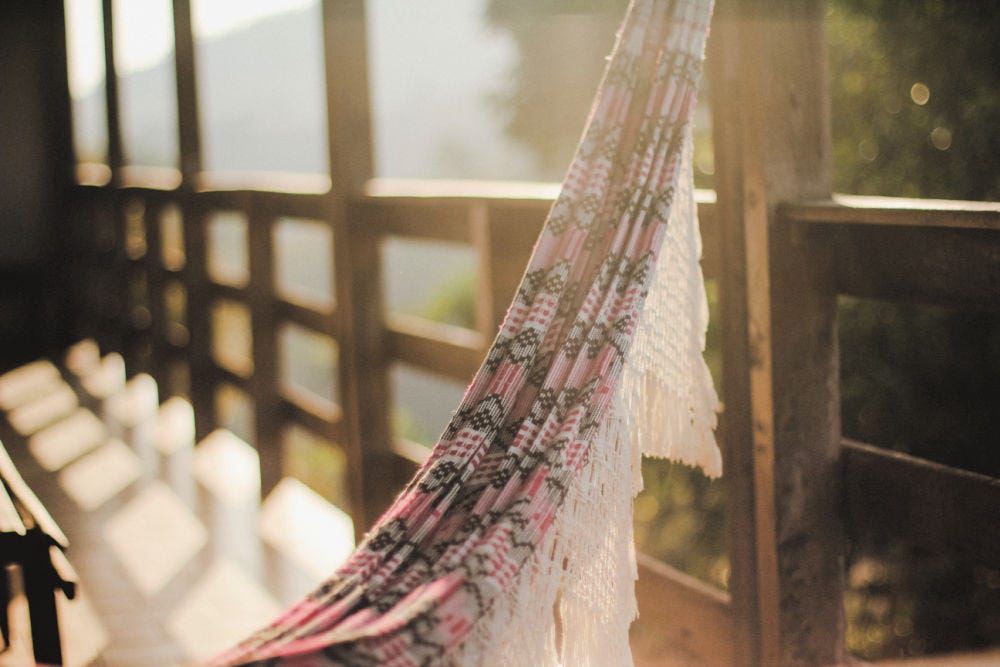





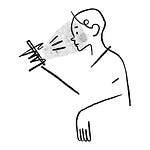
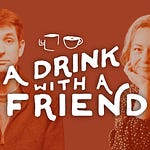
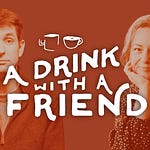
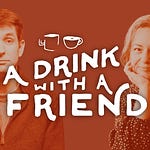
Real Rest